Neuvic is a small town in Corrèze, France. If you want to spend some time in the French countryside, Neuvic should be right up your street and there are plenty of things to see and do.
I’m not claiming to have compiled a definitive list of places to see in Neuvic, but I lived there for a month and when I wasn’t working I made time to do some exploring.
While I was exploring the town and surrounding area, I saw many things and didn’t know what they were. Although Neuvic is only a small town it has a tourist information office [MAP] so I popped inside seeking answers to my questions.
When I showed the girl behind the counter some pictures I’d taken, she gave me a free booklet that contains information about some of the things I’d seen. Out of 19 pages, only three of them are about Neuvic. The rest have information about neighbouring towns. To be honest, the pamphlet doesn’t contain much information at all but it’s better than nothing and made it easier to seek out information online.
One of the most surprising things of all is, there are several points of interest I discovered on my own that are not mentioned in the pamphlet at all. Yet some of the things that are included are not particularly interesting.
Okay, that’s enough back-story, here are the things I found to see and do while I was living in Neuvic.
1. La Tour des Cinq Pierres (The Tower of Five Stones)
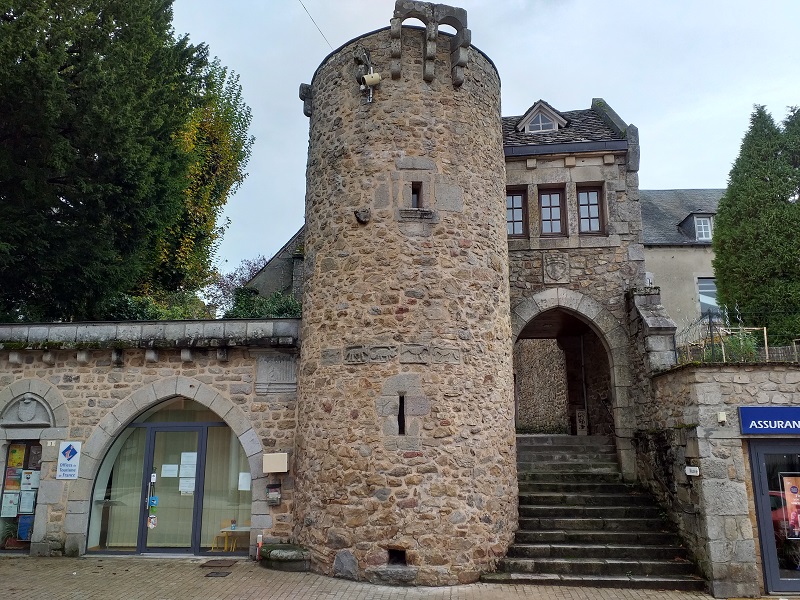
In the distant past, Neuvic was protected by a wall. Most of the wall is gone, but parts of it still remain. La Tour des Cinq Pierres would have originally been used as a lookout post. It remains intact and the present-day tourist information office is built into the section of wall beside it.
La Tour des Cinq Pierres takes its name from the five stones that are visible on the front. The carving on the stones represents various animals including, a dog, a bull, and a bird. It’s been speculated the five stones may have been cannibalised from the remains of a long-gone castle.
2. La Place Gambetta
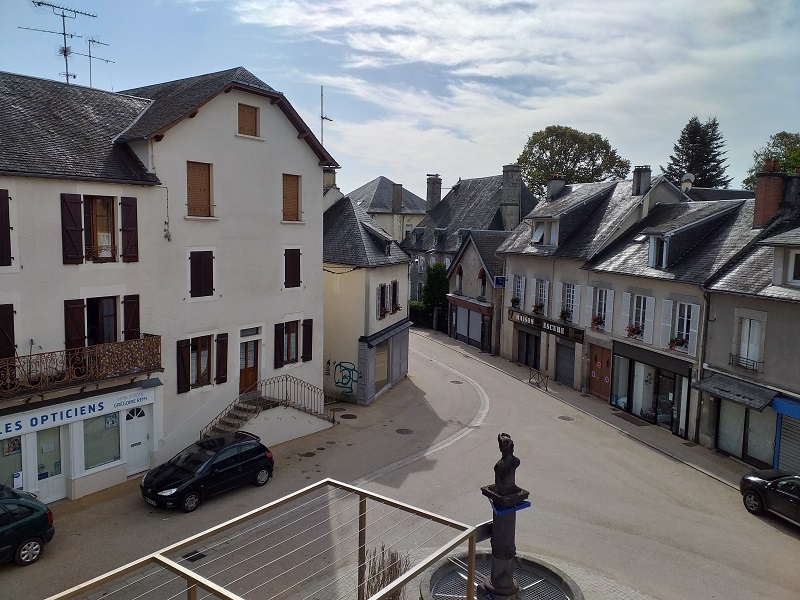
La Place Gambetta is named after the 37th Prime Minister of France, Léon Gambetta (1838-1882). It’s the main town square [MAP].
The focal point is the fountain in the centre of the square. It was built from Volvic stone in 1866. The bust above the fountain shows Marianne.
Sometimes referred to as the Goddess of Liberty, Marianne was not a person. The Marianne busts and effigies you can see all over France are symbolic. They represent the embodiment of the French Republic. [Marianne and the motto of the Republic]
While I was in Neuvic, the fountain in La Place Gambetta wasn’t working- There was no water in it at all but it was the back end of the year. Perhaps during the summer when there are more tourists, things may be different.
3. La Chapelle de Pennacorn
 La Chapelle de Pennacorn (Penacorn Chapel) is a small chapel situated in the woods about 2 km from the centre of the town. Despite its name, La Chapelle de Pannacorn is actually more like a shrine. People who visit it pay their respects to the Virgin Mary in front of the building instead of inside. The door at the back of the building is locked and the room behind it appears to be used as a storage area. At least that’s what it looked like when I put my face to the window and took a peek inside.
La Chapelle de Pennacorn (Penacorn Chapel) is a small chapel situated in the woods about 2 km from the centre of the town. Despite its name, La Chapelle de Pannacorn is actually more like a shrine. People who visit it pay their respects to the Virgin Mary in front of the building instead of inside. The door at the back of the building is locked and the room behind it appears to be used as a storage area. At least that’s what it looked like when I put my face to the window and took a peek inside.
The chapel stands on the spot where a miraculous event took place several hundred years ago. It’s quite a long story. I’ve written about it in detail elsewhere on this blog: [A Place of Reverence Among the Trees]
4. L’Eglise St-Etienne
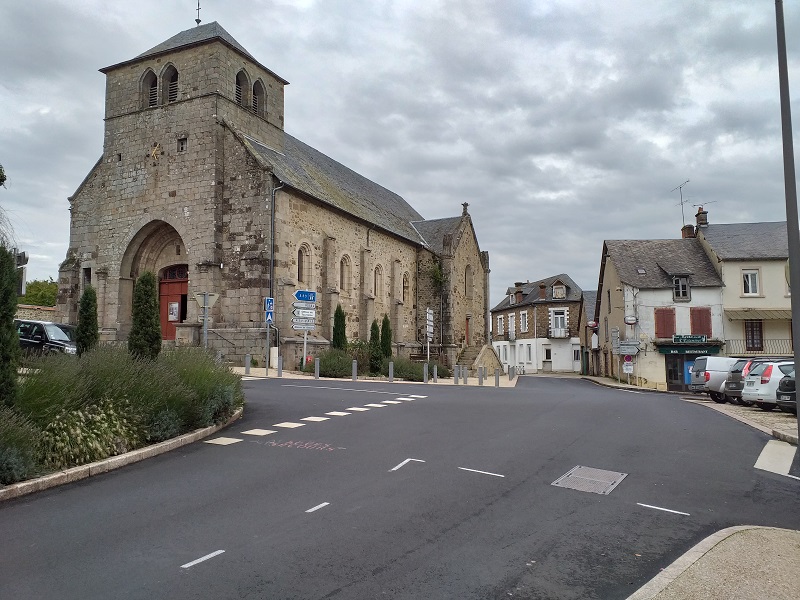
L’Eglise St-Etienne is the local church. It’s only a couple of minutes walk from La Place Gambetta.
As you can see from the picture above, the bell tower is shorter and wider-looking than the ones you see in many other parts of Europe.
During the day, the door of the church is normally open so it’s easy to go and look inside. When you do, notice the low ceiling, made of wood. Depending on where you come from and the types of churches you’ve visited in the past, this type of church ceiling may not come as a surprise. Most of the churches I’ve been in are in England. None of them had this type of ceiling so I noticed it at once.
L’Eglise St-Etienne used to house an important religious relic but it was stolen in 1983. If you’ve read my blog post about La Chapelle de Pennacorn, you should already be familiar with the story. If you haven’t, here’s the link again: [A Place of Reverence Among the Trees]
5. Monument de la Résistance
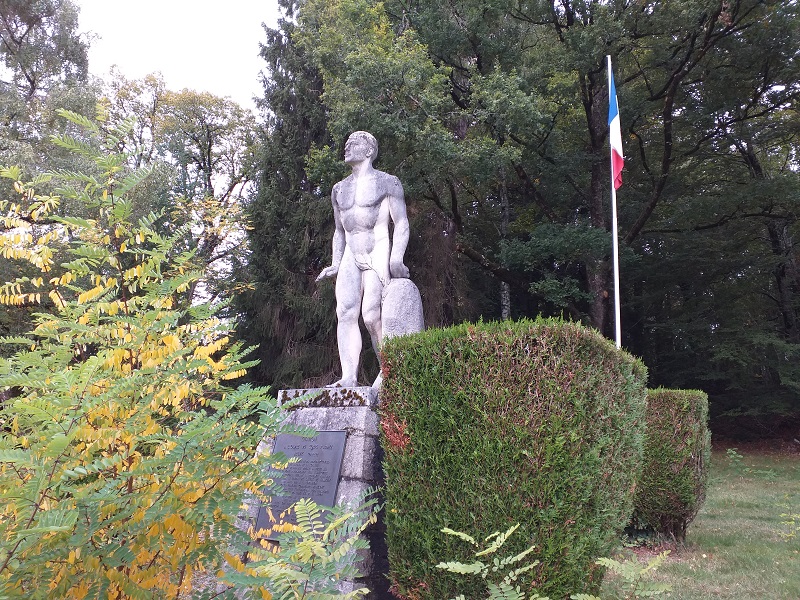
It’s probably not worth making a special trip to Neuvic just to see the Monument de la Résistance but you might as well take a look if you are already there.
It’s basically just a statue that pays homage to all the soldiers from Neuvic who died during the Second World War.
As for who carved it and how long it’s been there, I was unable to find out, but it stands in a nice spot, on the top of a hill, with it’s back to the woods. It’s not far from the local Citroën garage. [MAP]
6. Barrage de Neuvic (Neuvic Hydroelectric Dam)
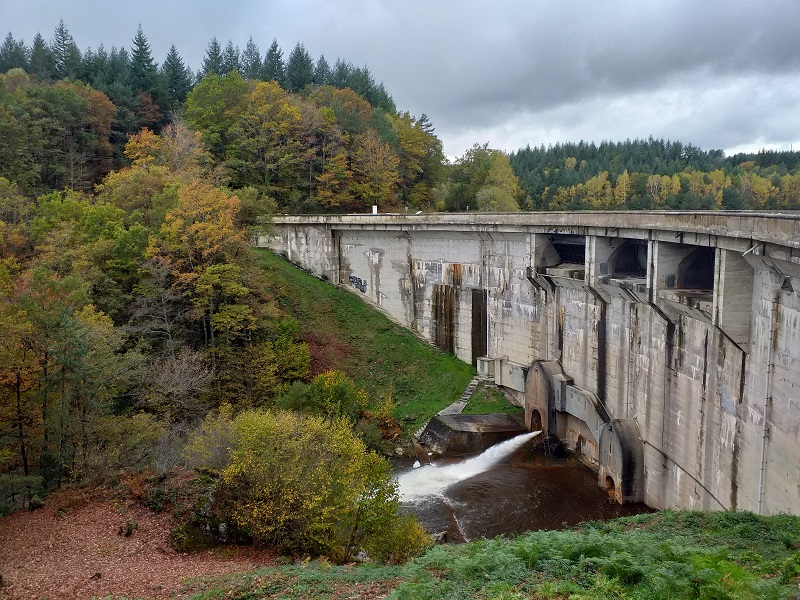
The hydroelectric dam at Neuvic was built between 1942 and 1945 and stands 27 meters high. The Triouzoune river is on one side of the dam and the Lake Triouzoune is on the other.
It should take 35-45 minutes to get to the dam if you are walking from the centre of town [MAP].
7. Lac de Triouzoune (Lake Triouzoune)
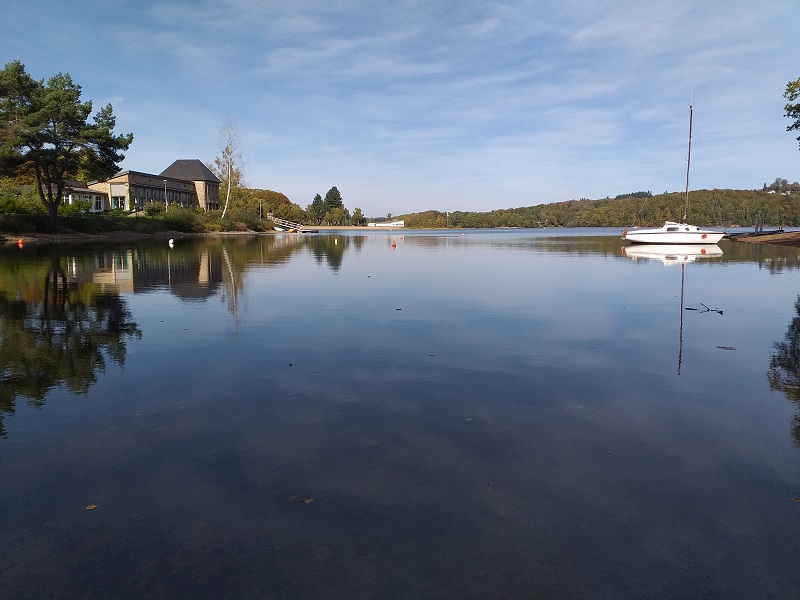
Lake Triouzoune is a popular spot with locals and tourists alike. It’s a 7 km stretch of water, surrounded by woodland. There are campgrounds and holiday accommodation next to Lac de Triouzoune. It may surprise you to learn there’s a beach as well.
The lake has supervised swimming, fishing, water skiing, and a whole lot more to offer and, not surprisingly, lots of people go there to enjoy time in their boats.
8. Remains from the St Projet Convent
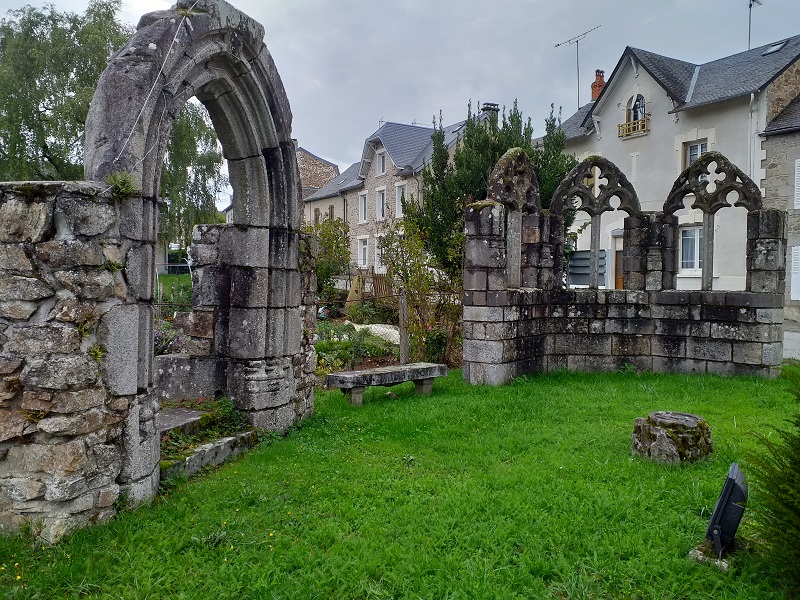
These stones do not belong in Neuvic. The remains you can see in the picture are part of a convent that was in a small village called St Projet. It used to be near the Dordogne river but was destroyed during the construction of the Neuvic Dam.
So if you go and see the stones, you won’t be looking at an actual ruin. You’ll be looking at pieces of convent that were brought to Neuvic and kept for posterity. If you visit Neuvic, you’ll find the convent remains at the side of the road, directly in front of the roundabout that marks the intersection of the D20 and the Rue de la Triouzoune [MAP].
9. Caryatids Outside the Vocational School
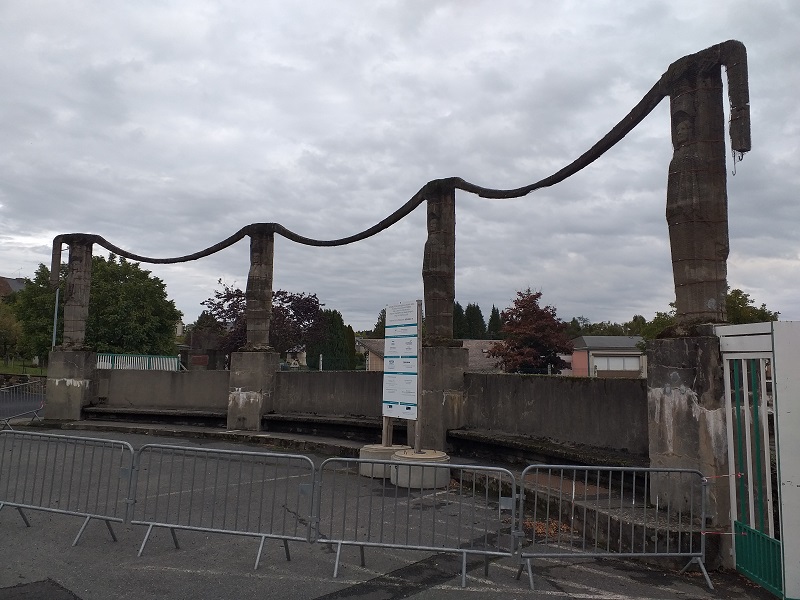
The Lycée des métiers Marcel Barbanceys used to be a school of rural crafts. It’ presently a vocational college where students go to learn about agricultural machines. [MAP]
Caryatids are the sculpted female forms that act as support pillars in Greek-style buildings. The caryatids outside the vocational school at Neuvic are the work of Henri Proszynsky (1887-1969). They appear to be more artistic than functional. The columns of stone are only there to support the wavy length of carved stone above them.
10. Musée Départemental de la Résistance Henri Queuille
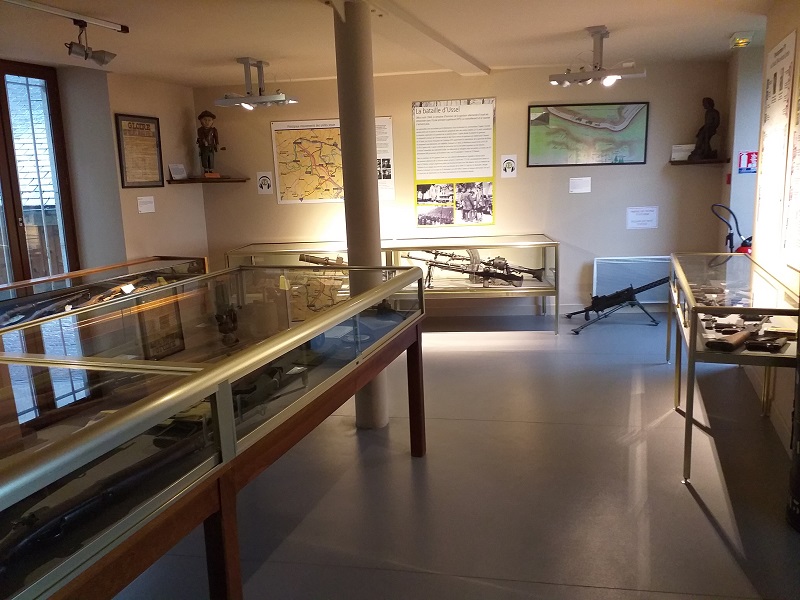
You’ll find this museum in the centre of the town. It’s open seven days a week and your visit won’t hammer a hole in your pocket or purse because admission is free. [WEBSITE]
The museum has three floors. The artefacts and displays on the ground floor pay homage to the life and political career of Henri Queuille (1884-1970).
Queuille was born in Neuvic and went on to become the French Prime Minister. He was elected to office three times.
The first floor of the museum provides an insight into life in Neuvic during the Second World War. It has several areas. One area displays the printing presses that were used for producing underground newspapers during the war. An adjacent area has various types of radio receivers and transmitters.
The first floor of the Henri Queuille Museum in Neuvic also has many cabinets full of weapons and medals. I was particularly interested to see a white shirt made from parachute material.
The second floor of the museum houses an archive/library where visitors can learn more about the history of Neuvic and life during the Second World War. It’s also the place to go if you want to know more about the area’s agricultural heritage.
The second floor is inaccessible most of the time but visitors are allowed to access it upon request.
When you enter the museum you will notice everything is written in French. There are no English translations. However, the museum staff can give you an audio guide set to the language of your choice.
More Things to See and Do in Neuvic
I can recommend the Hop Hop Hop Cafe de la Poste. It’s very popular with the locals, appears to be the most lively bar in Neuvic, and often hosts live bands. On special occasions, you may find the party is still going strong the Hop Hop Hop long after the normal closing time.
Le Jardin Public (Public Garden) contains some interesting sculptures and an impressive multi-level fountain. The fountain was dry during my stay in Neuvic but I’d be surprised if that was the case during the tourist season.
I never got around to visiting it, but there is an old wash house from the 1930s that’s cleverly designed to make use of rainwater dripping in form the ceiling.
Although Neuvic is only a small town, there is quite a lot there. This blog post barely scratches the surface and the choice of activities available on and around the lake are likely to increase considerably during the summer.
If you are planning on visiting Neuvic and are looking for ideas about things to see and do, I hope the information I’m sharing is useful. If you are familiar with the area and think I’ve omitted something important, please feel free to let me know in the comments section below. Your input may be useful to other people who are planning on visiting Neuvic and want ideas for good ways to spend their time.
– – – – –
– – –
– – –
– – – – –
